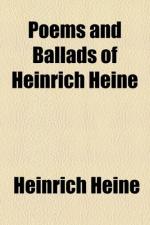|
This section contains 8,402 words (approx. 29 pages at 300 words per page) |

|
SOURCE: "Poetry for the Republic: Heine and Whitman," in Heinrich Heine and the Occident: Multiple Identities, Multiple Receptions, edited by Peter Uwe Hohendahl and Sander L. Gilman, University of Nebraska Press, 1991, pp. 199-223.
In the following essay, first presented at a symposium in 1988, Berman compares the poetry and political agendas of Heine and the American poet Walt Whitman.
It was a tricky situation in which Thomas Mann found himself in October 1922. Addressing a conservative audience hostile to the young Weimar Republic, the renowned author, whose wartime support for the German Empire against the Western democracies had won him acclaim in nationalist circles now undertook the onerous task of convincing his listeners of the worthiness of democracy. Avoiding the easy path of pragmatic realism—democracy as the result of the military defeat of the empire in 1918 or as an ideological demand of the emergent American hegemony—he attempted instead...
|
This section contains 8,402 words (approx. 29 pages at 300 words per page) |

|


